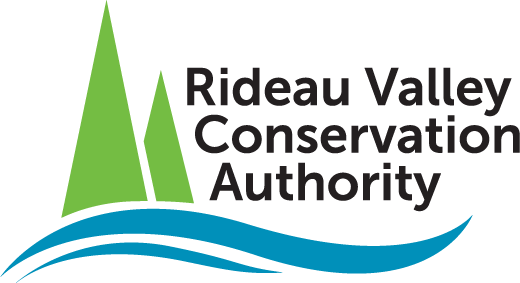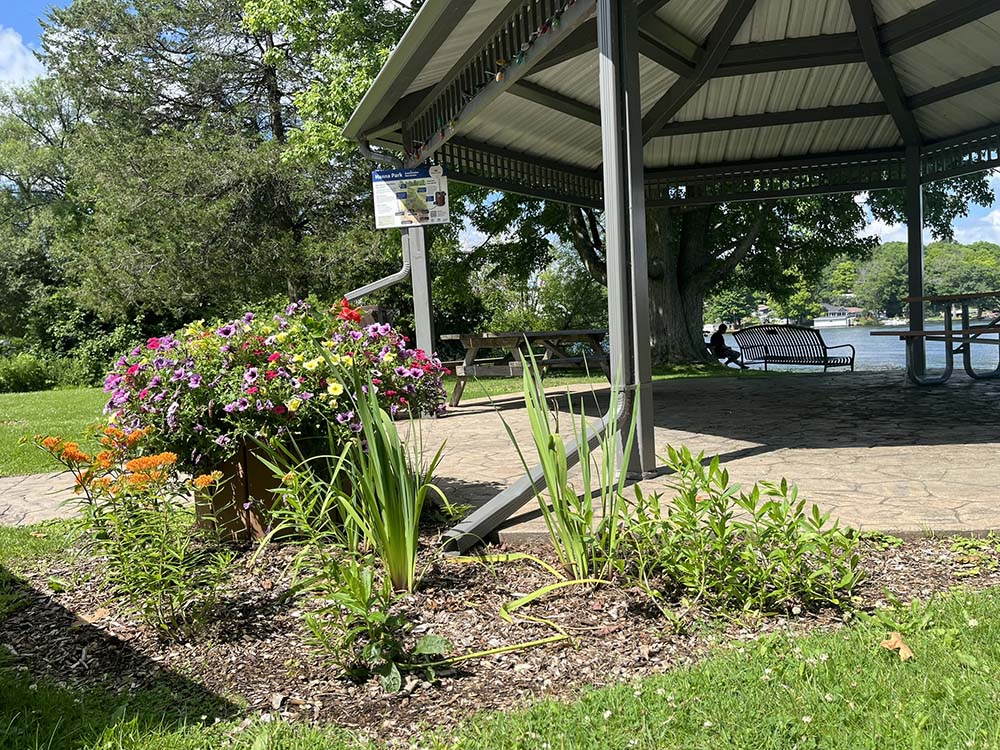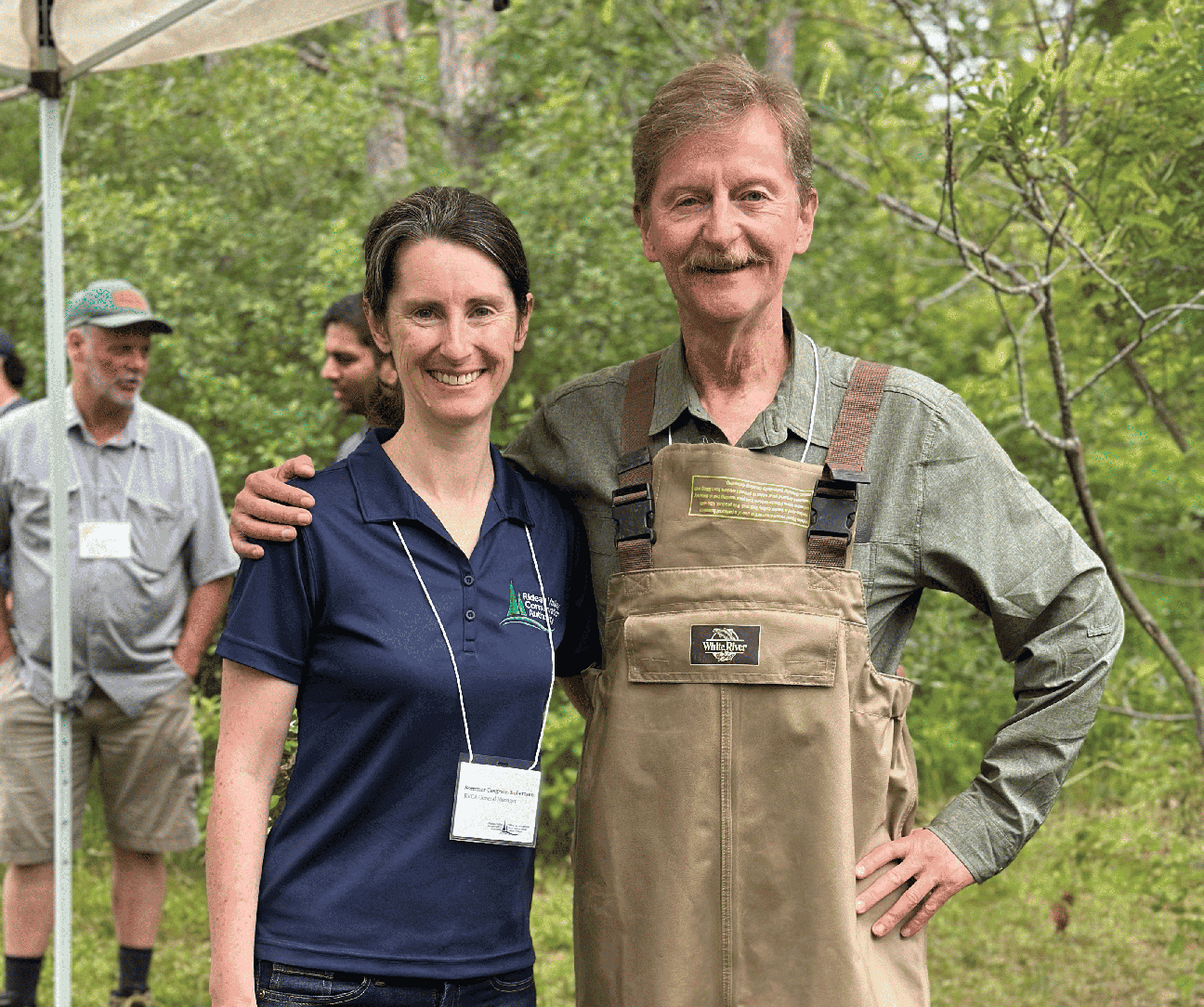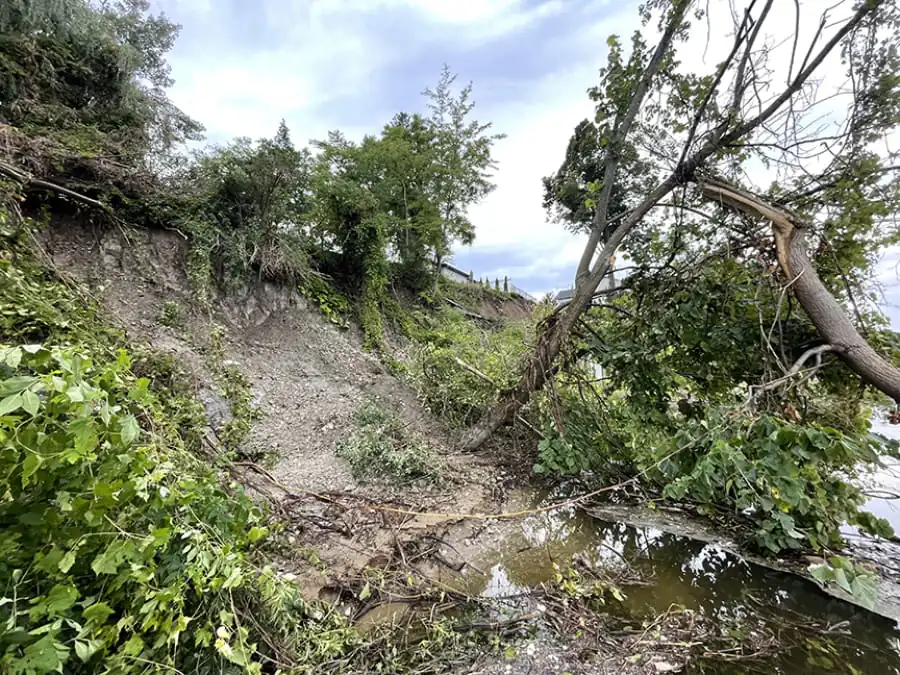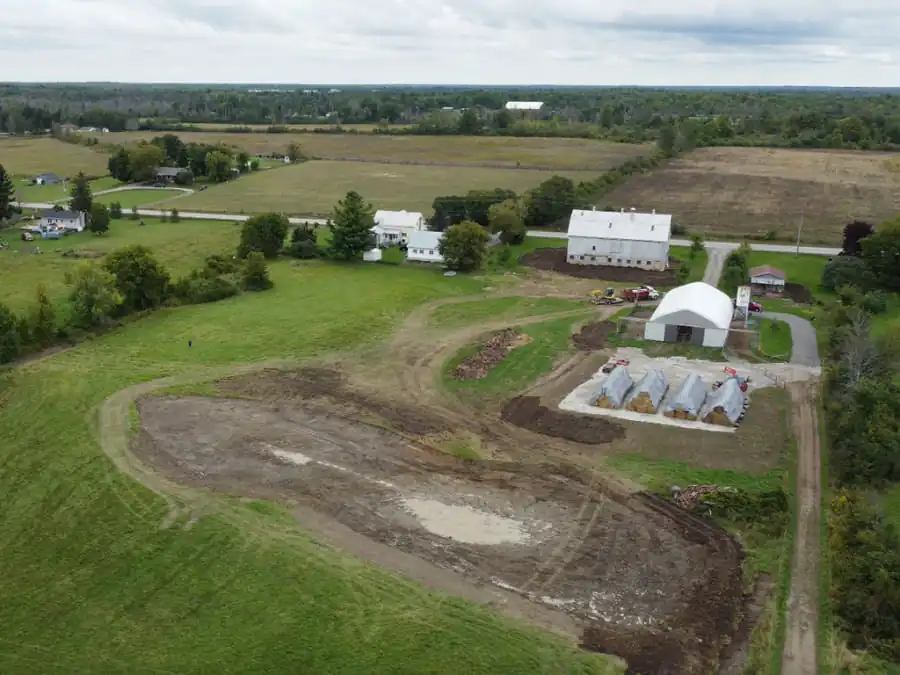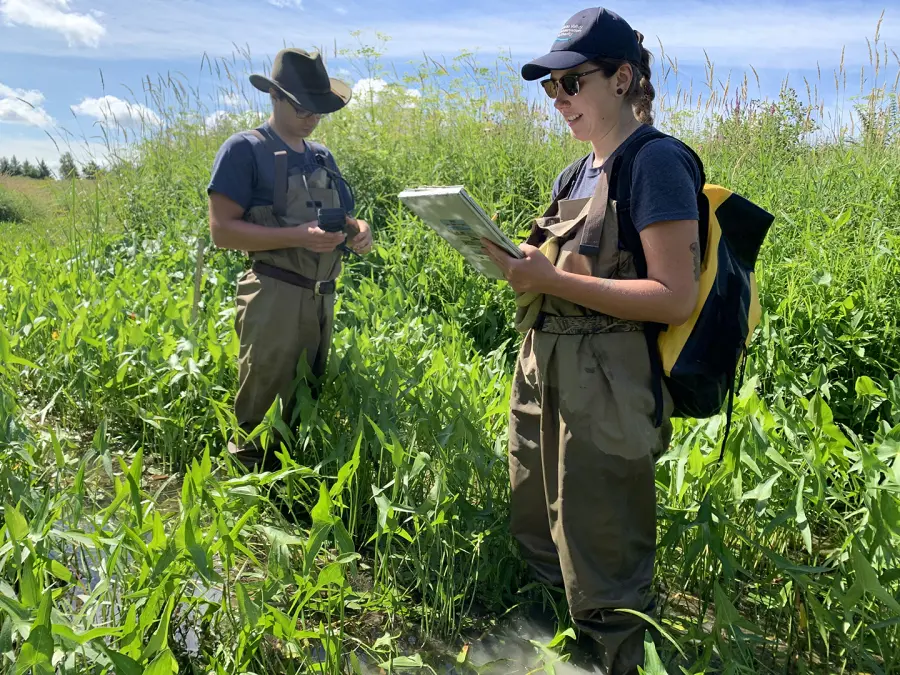News & Stories
February 21, 2025 – For someone who’s hiked the Perth Wildlife Reserve “more times than I can count,” being elected Chair of the Rideau Valley Conservation Authority’s board of directors is “very exciting.”
Perth councillor Gary Waterfield was elected to the one-year term at the RVCA’s board meeting on January 23, 2025. Past chair and North Grenville councillor Kristin Strackerjan was elected Vice Chair.
“This role is very much aligned not only with my lifestyle, but with my values and what’s important to me,” said Waterfield, who describes himself as an avid hiker and kayaker, with an interest in urban planning and municipal governance. He also sits on the board of the Perth and District Union Library and is an active member of the Friends of the Tay Watershed and the Rideau Trail Association.
“I’m passionate about what the RVCA is all about; its mission and its vision,” Waterfield added. The RVCA is one of 36 conservation authorities in Ontario responsible for furthering the conservation, restoration, development and management of natural resources under the provincial Conservation Authorities Act. With a watershed draining more than 4,000 square kilometres across 18 member municipalities – from its headwaters in Central Frontenac all the way to Rideau Falls in downtown Ottawa – the RVCA protects people and property from natural hazards like flooding and erosion while conserving the wetlands, forests and natural areas that reduce their impacts.
RVCA general manager Sommer Casgrain-Robertson congratulated Waterfield, who has been a board member for two years.
“We know that he will bring passion, experience and vision to the role," said Casgrain-Robertson, adding her thanks for the outgoing Chair. “We thank Councillor Strackerjan for her strong and steady leadership during a busy two years.”
Waterfield, a retired human resources consultant, said one of his priorities as Chair is to increase staff interaction with the board of directors, so directors can better promote the value of the RVCA and its diverse programs.
“The average citizen knows conservation authorities play an important role in developing our communities safely and sustainably,” Waterfield said. “But there are many other valuable RVCA programs that we can promote as well, such as stewardship opportunities and watershed monitoring.”
Waterfield said his personal goal is to visit all 11 conservation areas operated by the RVCA by the end of his term.
To learn more about the RVCA or to access meeting minutes and agendas, visit www.rvca.ca/governance.
-30-
The Rideau Valley Conservation Authority is seeking feedback from the public on its mandatory hazard management programs, as part of the development of a Watershed-Based Resource Management Strategy required under Ontario Regulation 686/21.
All residents, landowners, municipal partners, agencies and businesses in the Rideau Valley are invited to complete a survey on the delivery and improvement of mandatory programs and services including Flood Forecasting and Warning, Drought or Low Water Response, Land Use Planning advisory services and application of development regulations in natural hazard areas.
Natural hazard areas include river or stream valleys, unstable soils or bedrock, areas affected by flooding, erosion or dynamic beaches, and wetlands.
The survey is open until November 18, 2024. Survey results will be used to prepare an interim Watershed Management Strategy, which will be followed by more extensive stakeholder and public consultation in 2025 to inform a more detailed and comprehensive Watershed Management Strategy. Next year’s Strategy will dive deeper into RVCA’s work and will encompass all programs and services as the RVCA prepares a new Strategic Plan.
For more information contact
After three successful seasons as ALUS Lanark, the environmental stewardship program for farmers will now be available to all agricultural properties within the Rideau Valley and Mississippi Valley watersheds.
The expanded ALUS Mississippi-Rideau program will help farmers complete ecosystem projects such as reforestation, windbreaks, riparian buffers, wetland projects, grassland and pollinator habitat, delayed cut/grazing, and clean water projects. Farmers are eligible to have project costs covered in part or in full, and they may be eligible to receive annual payments for the ecosystem services they’ve added to their property.
The program is jointly administered by the Rideau Valley Conservation Authority (RVCA) and the Mississippi Valley Conservation Authority (MVCA) as part of their broader complement of stewardship programs and grants. Under ALUS Lanark, a total of 44 projects created 320 acres of habitat enhancements on 19 properties. By expanding the reach of the program, it will accelerate those successes and spread them across the region for the benefit of all.
The new ALUS Mississippi-Rideau program will cover 8,500km2 which encompasses 31 municipalities and is home to approximately 986,000 people. In this region, agriculture is the backbone of many local communities and farmers have been stewards of the land for generations. ALUS recognizes the value of their stewardship efforts and provides financial support to enable farmers to continue producing food and commercial goods while protecting and enhancing habitat, biodiversity and clean water.
“We’re thrilled to expand this partnership with ALUS to reach even more farmers across the watershed,” said Sommer Casgrain-Robertson, General Manager of the RVCA. “We’ve seen a steady uptake from Lanark farmers, and there is a growing interest across the watershed. We’re grateful to local farmers for all they do, so we’re excited to provide additional incentives so they can complete more conservation projects that improve the health of our watershed, our communities and local farmland.”
MVCA’s general manager said partnerships like this help farmers to pursue Environmental Farm Plans (EFP) and related projects during tough economic times.
“The farmers know these projects can enhance their operations including their water management, and ALUS makes it possible to take the leap,” said Sally McIntyre, MVCA’s General Manager.
ALUS Mississippi-Rideau will continue to be guided in its decision making by a Partnership Advisory Committee (PAC) to ensure local priorities are addressed by approved projects. Fifty per cent of the committee are local farmers who, in partnership with the other committee members (local elected officials, environmental experts, etc.), will determine which projects are prioritized for ALUS funding.
About ALUS
ALUS (originally an acronym for Alternative Land Use Services) is a charitable organization that sustains agriculture and biodiversity for the benefit of communities and future generations. ALUS provides direct financial and technical support to a network of more than a thousand farmers and ranchers who deliver ecosystem services in more than 30 communities across Canada, such as cleaner air, cleaner water, carbon sequestration, erosion control, flood mitigation, pollinator support and wildlife habitat. Learn more at ALUS.ca.
Public consultation is now open for several policy amendments to the Mississippi-Rideau Source Protection Plan. Proposed policy changes apply to the management of road salt, fuel tanks, agriculture, pesticides, fertilizers, chemical storage, snow storage and other potential drinking water threats near municipal wells or intakes.
The Mississippi-Rideau Source Protection Plan is a locally developed plan to keep our municipal drinking water safe and clean. It is required under the Clean Water Act, 2006.
This Plan is overseen by the Mississippi-Rideau Source Protection Region, and has been in effect since 2015. This plan contains policies for activities that have been determined to be significant drinking water threats (as determined by the Technical Rules under the Clean Water Act, 2006) in areas near municipal groundwater wells and surface water intakes. It is currently undergoing an update to align with recent legislative changes from the Ministry of Environment, Conservation and Parks. The updates will only apply to a select number of properties located within designated drinking water protection zones.
Drinking water sources in the Mississippi-Rideau Source Protection Region include groundwater drawn from aquifers underground, and water drawn from the Ottawa River, Rideau River, Tay River and Mississippi River. The Source Protection Plan sets out policies that use a variety of tools to protect municipal drinking water sources from contamination. These tools include education, risk management planning, prohibition and land use planning. Visit the Source Protection Region’s local website at www.mrsourcewater.ca to find out more.
The Source Protection Region is required to consult with the public on the proposed changes. Digital copies of the proposed updates can be found at www.mrsourcewater.ca/en/consultation, or hard copies can be viewed by appointment at the Rideau Valley Conservation Authority headquarters in Manotick. Members of the public can provide feedback on the proposed changes until November 22, 2024.
If you have questions or wish to provide comments about the proposed changes, please contact Marika Livingston at 613-692-3571 ext. 1148 or
RIDEAU AND MISSISSIPPI WATERSHEDS - This summer’s weather has been unpredictable at best: torrential rains, extreme heat and even a recent tornado on Christie Lake near Perth.
With this volatility becoming the norm, planting trees on marginal land or unused fields can help protect your property by reducing erosion, creating windbreaks, improving drainage, providing shade and more.
And, comparatively at least, it’s not expensive. The Rideau Valley Conservation Authority (RVCA) offers generous tree planting subsidies for rural landowners in the Rideau and Mississippi watersheds with at least 1.25 acres of suitable land. The full-service program includes customized tree planting plans that suit the landowner’s vision and needs, on-site technical advice, ordering and handling of trees, site preparation, tree planting and tending, and survival assessments for five years.
Landowner costs range from $0.15 per tree within the City of Ottawa to between $0.30 and $0.40 per tree outside the city, depending on quantity.
“It’s an incredibly economical way to protect and improve your property while cutting down on maintenance for idle fields and retired rough pasture,” said Ian Cochrane, RVCA’s forestry manager. “The program keeps your property working without having to do a lot of work yourself.”
Elizabethtown-Kitley farmer Tom Ronan said tree planting has saved him countless hours of bush-hogging since he planted 7,500 trees on several idle fields at the back of his 200-acre property. He’s also saved himself the cost of fuel to run the mowing machine. On top of that, he said it feels good to leave a legacy for future generations.
“By the time these new trees mature, there’s a good chance I won’t be around. But my kids and my grandkids will have an opportunity to enjoy it,” Ronan said. “The trees represent a new growth for the farm. They’ll put some of the scrub land back into use, and it’s helping the environment.”
RVCA’s forestry staff work with landowners across both the Rideau Valley and the Mississippi Valley watersheds. They are now booking site visits for this summer and fall to prepare for tree planting in spring 2025.
To book your site visit, contact Ian Cochrane at
Invasive species can wreak havoc on our native ecosystems, but a free community workshop aims to help local residents and community groups identify the region's most problematic invaders so they can stop them from spreading even further.
Staff from the Rideau Valley Conservation Authority will host the workshop on Saturday, July 20 at the authority’s headquarters at 3889 Rideau Valley Drive in Manotick. From 9 a.m. to noon, participants can enjoy presentations as well as hands-on displays of invasive plants and animals.
“The more people know about invasive species and how to stop them, the better,” said Eric Guitard, RVCA’s City Stream Watch Co-ordinator. He said this year’s workshop will include information on up-and-coming invaders, in an effort to get ahead of them. “By reducing the spread, we can give our native species a fighting chance and promote a more balanced and diverse local ecosystem.”
Invasive plants like Himalayan Balsam, garlic mustard, Japanese knotweed and dog-strangling vine can spread rapidly, pushing out native species and leaving gaps in the area’s biodiversity. This can reduce food supplies and resources for other species who rely on the missing native plants. Invasive plants are also often poor substitutes when it comes to erosion and flood mitigation, as their roots generally aren’t as deep or strong.
In the water, invasive aquatic species can have dramatic ecosystem impacts while also measurably changing water quality and characteristics. For example, invasive zebra mussels filter suspended particulates so effectively they can cause distinctly weedier lakes, since sunlight can reach further into the water column.
“It’s a group effort to keep our local environment as natural and functional as possible for everyone’s benefit,” Guitard said. “We’re excited to welcome residents as passionate as we are about making a difference.”
Space is limited. Advanced registration is required by filling out this form or emailing
Catching frogs, roaming the woods and exploring the outdoors are what summer is all about, and Foley Mountain has added a new suite of summer programs to help make it happen.
Family programs such as pond study, bug exploration, survival skills and geocaching will be offered the first Saturday of the month and on four Fridays throughout the summer. Every second week beginning July 16, forest school sessions will be offered Tuesdays, Wednesdays and Thursdays.
Unlike school-year forest school programs, all of these programs can be booked one at a time, so residents and cottagers can pick and choose which dates work for them.
“It’s a chance to try out our programs in a fun and low-pressure way,” said site supervisor and outdoor education co-ordinator Rebecca Whitman. “We hope these programs will help local families get outside and reconnect with nature after a long school year.”
The summer programming schedule kicks off Saturday, July 6 with an Outdoor Survival Skills program for the whole family from 10 to 11:30 a.m. August’s weekend program will feature a beaver pond bonanza on Saturday, Aug. 3.
Forest Fridays will offer similar family programming on July 19, August 2, August 9 and Aug 23. For younger families looking for even more time together on the mountain, Family Forest School will run bi-weekly on Tuesdays beginning July 16, targeting kids ages 2 to 5 and their caregivers.
For kids ready for parent-free programming, half-day Forest Kindergarten will welcome kids ages 4 and 5 for a morning of fun every second Wednesday beginning July 17. Kids ages 6 to 12 can come from 9 a.m. to 12 p.m. or 9 a.m. to 3 p.m. every second Thursday.
Registration is required and will close the Wednesday prior to the program date. Programs may be cancelled if there is not enough interest. Fees vary depending on the program. For full details and to register, visit www.rvca.ca/outdoor-education and follow the links to the Foley Mountain programs, or contact Rebecca Whitman at
Dignitaries, donors, and special guests joined staff and board members from the Rideau Valley Conservation Foundation (RVCF) and Rideau Valley Conservation Authority (RVCA) to celebrate the Baxter Conservation Area’s flagship accessible bridge’s grand opening on Friday, June 21.
The 100-metre accessible bridge and two large education platforms embrace the gold standards of accessible design, including a 10-foot-wide deck, appropriate sight-lines for people in wheelchairs and strollers, gentle slopes, handrails and benches.
The impressive span was made possible with generous support from the Government of Canada, through the Federal Economic Development Agency for Southern Ontario (FedDev Ontario), and the City of Ottawa’s Rural Community-Building Grant, as well as in-kind and financial support from the RVCF, RVCA, and their generous donors.
“Accessibility improvements to this area and two new educational platforms will make this beautiful green space a safe and welcoming destination for all to enjoy,” the Honourable Filomena Tassi, Minister responsible for FedDev Ontario wrote in a prepared statement. “The Government of Canada is happy to have supported the Rideau Valley Conservation Foundation.”
Rideau-Jock Councillor David Brown thanked the Nature For All committee, which brought its grand vision of an accessible nature destination to the Rideau Valley Conservation Authority and its Foundation six years ago. Brown also recognized the hard work of the many RVCA and RVCF staff, volunteers and board members who have helped turn this vision into reality.
“This project was not easy,” Councillor Brown said. “What we’re looking at today really shows that hard work, the dedication and the consistent pressure to make life better out here for everyone of all ages and abilities.”
In total, Baxter’s accessible bridge project garnered more than $800,000 in support, including donations from 100 Women Who Care, 1st Greely Cubs, Fjällräven, FedEx Canada, Girl Gone Good, and The Gosling Foundation. The RVCA also contributed from its capital infrastructure funds.
“Each year, Baxter welcomes thousands of visitors and more than 4,000 students to its facilities to enjoy the trails, beach and outdoor education programming,” said RVCA Chair Kristin Strakerjan. “The new bridge will help visitors of all abilities enjoy an enhanced outdoor experience while taking advantage of the many physical and mental health benefits that go with it.”
The previous bridge was at the end of its life cycle and was closed for safety reasons in 2019. Cue Mike Nemesvary, an accessibility advocate located in Manotick who has been visiting Baxter Conservation Area in his power wheelchair for more than 20 years. An athlete and adventurist, Nemesvary had long dreamed of transforming Baxter into an accessible nature haven for people of all abilities. Working with the RVCA and RVCF, he founded the local Nature For All committee to bring his vision to life.
"My partner Maryann and I have been continual visitors to Baxter, which includes a sandy beachfront, five kilometres of nature trails, picnic areas, lookouts, marshlands, a nut grove and a multitude of ecologies," said Nemesvary as he addressed a crowd of 75 people gathered to open the bridge. “This unique bridge is the culmination of a grand vision, a dedicated committee and an outpouring of support from private and public sectors for the past six years."
And the accessibility transformation continues.
“There’s more work to be done, including rebuilding and replacing the 950 metres of accessible raised boardwalk and trails that will lead people of all abilities to this magnificent spot,” said RVCF Board Chair Andrew Harkness. “We are excited to continue Phase 2 of this shared mission with support from our partners and generous community members.”
To learn more about the Nature For All project visit www.rvcf.ca/nature-for-all.
To learn more Baxter Conservation Area visit https://www.rvca.ca/conservation-areas/baxter
South Nation Conservation (SNC), Rideau Valley Conservation Authority (RVCA) and the Raisin Region Conservation Authority (RRCA) are welcoming public input on updated development policies and wetland mapping used in Conservation Authority permitting.
On April 1, 2024, the Government of Ontario replaced individual Conservation Authority Regulations under Section 28 of the Conservation Authorities Act, with Ontario Regulation 41/24: Prohibited Activities, Exemptions and Permits. This update requires Conservation Authorities to regulate development activities within 30 metres of all wetlands, as defined by the new regulation.
Conservation Authority staff have completed draft updates to policies, procedures and mapping in response to these provincial changes. Watershed residents are invited to schedule individual meetings (in-person or virtual) or attend an upcoming public open house to learn more about proposed development policy updates and wetland mapping.
|
Civitan Club of Perth |
R.J. Kennedy Community Centre |
|
RVCA Administrative Office |
SNC Administrative Office |
Wetlands provide significant ecosystem services and benefits including flood attenuation, erosion protection, groundwater recharge, filtration of drinking water supplies, wildlife refuge, and forest cover, as well as recreational, educational, and research opportunities. Wetlands are also usually associated with unstable, organic soils and not always suited to development.
The Conservation Authority partners have regulated development activities within Provincially Significant Wetlands and certain Locally Significant Wetlands since 2006. With the new provincial regulation, most wetlands will now be regulated, however, the buffer around them where a development permit is required has been reduced from 120 metres to 30 metres.
“We recognize the important role of wetlands for the environment and our communities,” said SNC Managing Director, John Mesman. “We will work closely with property owners looking to develop their properties to help confirm wetland boundaries to ensure that future development is sustainable and protects the integrity of wetland habitat.”
“Many of the wetlands in our region connect to major waterways and are found within our Natural Heritage Systems,” said RRCA General Manager Alison McDonald. “These areas provide important natural cover, wildlife habitat, and mitigate the impacts of climate change, including flooding and drought.”
“Having updated policies and wetland mapping that reflects the new legislation will also streamline approvals and standardize approaches,” said RVCA General Manager Sommer Casgrain-Robertson. “Policies and mapping are used by staff, municipalities, and property owners to ensure that development is undertaken in a way that protects people and their property from natural hazards while also protecting wetlands and watercourses.
Policy information, draft maps and meeting request links are available online:
- SNC: nation.on.ca/consultations
- RVCA: rvca.ca/regulations-planning
- RRCA: rrca.on.ca/permits
Conservation Authorities work on behalf of their member municipalities to help manage, conserve and restore natural resources and guide sustainable development activities through permitting.
Through acquiring ecologically significant property, managing conservation lands, permitting sustainable development, and providing technical advice and cost-share funding for habitat improvement projects, there are a variety of ways to help improve wetlands and biodiversity within the region. Residents interested in learning more about land donations and project funding are encouraged to contact their local Conservation Authority.
FOR MORE INFORMATION:
South Nation Conservation
Erin Thorne, Communications Specialist,
1-877-984-2948 |
Rideau Valley Conservation Authority
Diane Downey, Director, Communications and Outreach,
1-800-257-3504, ext.1126 |
Raisin Region Conservation Authority
Lisa Van De Ligt, Team Lead, Communications and Stewardship,
613-938-3611 ext. 223 |
- end -
Les offices de protection de la nature sollicitent l'avis du public sur la mise à jour des politiques de développement et de la cartographie des zones humides dans l'Est de l'Ontario
EST DE L'ONTARIO, le 7 juin 2024 : La Conservation de la Nation Sud (CNS), l'Office de protection de la nature de la vallée Rideau (RVCA) et l'Office de protection de la nature de la région Raisin (RRCA) accueillent les commentaires du public sur la mise à jour des politiques de développement et de la cartographie des zones humides dans l'Est de l'Ontario. Les politiques de développement et la cartographie des zones humides sont utilisées dans les permis délivrés par les offices de protection de la nature.
Le 1er avril 2024, le gouvernement de l'Ontario a remplacé les différents règlements des offices de protection de la nature en vertu de l'article 28 de la Loi sur les offices de protection de la nature par le Règlement de l'Ontario 41/24 : Activités interdites, exemptions et permis. Cette mise à jour exige que les offices de protection de la nature réglementent les activités d'aménagement dans un rayon de 30 mètres de toutes les terres humides, tel que défini par le nouveau règlement.
Le personnel de l'Office de protection de la nature a terminé l'ébauche de mises à jour des politiques, des procédures et de la cartographie en réponse à ces changements provinciaux. Les résidents du bassin versant sont invités à planifier des réunions individuelles (en personne ou virtuellement) ou à assister à une prochaine journée portes ouvertes pour en savoir plus sur les mises à jour proposées des politiques de développement et de la cartographie des zones humides.
|
Club Civitan de Perth |
Centre communautaire RJ Kennedy |
|
Bureau administratif de RVCA |
Bureau administratif de la CNS |
Les zones humides fournissent d'importants services et avantages écosystémiques, notamment l'atténuation des inondations, la protection contre l'érosion, la recharge des eaux souterraines, la filtration des réserves d'eau potable, les refuges fauniques, et le couvert forestier, ainsi que des opportunités de loisirs, d'éducation et de recherche. Les zones humides sont également généralement associées à des sols organiques instables et pas toujours adaptés au développement.
Les partenaires de l'Office de protection de la nature réglementent les activités de développement dans les zones humides d'importance provinciale et dans certaines zones humides d'importance locale depuis 2006. Avec la nouvelle réglementation provinciale, la plupart des zones humides seront désormais réglementées, cependant, la zone tampon autour d'elles où un permis d'aménagement est requis a été réduite de 120 mètres à 30 mètres.
« Nous reconnaissons le rôle important des zones humides pour l'environnement et nos communautés », a déclaré John Mesman, directeur, Terres protégées, de la CNS. « Nous travaillerons en étroite collaboration avec les propriétaires fonciers qui cherchent à développer leurs propriétés pour aider à confirmer les limites des zones humides afin de garantir que le développement futur soit durable et protège l'intégrité. d’habitats de zones humides.
« De nombreuses zones humides de notre région sont reliées aux principaux cours d'eau et se trouvent au sein de nos systèmes de patrimoine naturel », a déclaré la directrice générale de la RRCA, Alison McDonald. « Ces zones fournissent une couverture naturelle importante, un habitat faunique et atténuent les impacts du changement climatique, notamment les inondations et la sécheresse. »
« La mise à jour des politiques et de la cartographie des zones humides qui reflètent la nouvelle législation rationalisera également les approbations et normalisera les approches », a déclaré Sommer Casgrain-Robertson, directrice générale de RVCA. « Les politiques et la cartographie sont utilisées par le personnel, les municipalités et les propriétaires fonciers pour garantir que le développement est entrepris de manière à protéger les personnes et leurs propriétés contre les risques naturels, tout en protégeant les zones humides et les cours d'eau.
Des informations politiques, des projets de cartes et des liens de demande de réunion sont disponibles en ligne :
- CNS : nation.on.ca/fr/développement/consultations-publiques
- RVCA : rvca.ca/regulations-planning
- RRCA : rrca.on.ca/permits
Les offices de protection de la nature travaillent au nom de leurs municipalités membres pour aider à gérer, conserver et restaurer les ressources naturelles et guider les activités de développement durable au moyen de permis.
En acquérant des propriétés d'importance écologique, en gérant des terres protégées, en permettant le développement durable et en fournissant des conseils techniques et un financement à frais partagés pour des projets d'amélioration de l'habitat, il existe diverses façons d'aider à améliorer les zones humides et la biodiversité dans la région. Les résidents souhaitant en savoir plus sur les dons de terres et le financement de projets sont encouragés à contacter leur office de protection de la nature local.
POUR PLUS D'INFORMATIONS :
Conservation de la Nation Sud
Erin Thorne, spécialiste des communications
1-877-984-2948 |
Office de protection de la nature de la vallée Rideau
Diane Downey, directrice des communications et de la sensibilisation
1-800-257-3504, poste 200. 1126 |
Office de protection de la nature de la région Raisin
Lisa Van De Ligt, chef d'équipe, Communications et intendance
613-938-3611 ext. 223 |
In many ways, 2023 was the Year of the Bridge for the Rideau Valley Conservation Authority.
In its recently released annual report, it’s clear that 2023 was an extremely busy and productive year for all departments as they built bridges both real and figurative across the watershed.
In the most literal sense, staff completed the construction of two much-needed accessible pedestrian bridges at Baxter Conservation Area and Chapman Mills Conservation Areas, which will benefit the community for decades to come.
But staff also spent time connecting with valued partners, expanding their knowledge of the watershed and ensuring the RVCA’s services remain relevant, valuable and accessible to everyone who calls the Rideau Valley home.
Throughout 2023, RVCA staff:
- Welcomed more than 8,100 students to outdoor education programs at Baxter and Foley Mountain conservation areas;
- Planted 214,030 trees in partnership with private landowners, with $484,000 in external grant support;
- Funded 211 clean water projects on rural and farm properties, providing $642,935 in landowner grants;
- Naturalized 1,719 metres of shoreline with more than 9,300 native plants, including more than 1,000 planted at Last Duel Park in Perth;
- Sampled 39 lakes and 119 stream sites for surface water quality;
- Surveyed 361 stream sections to assess aquatic habitat conditions;
- Completed a once-in-a-decade Watershed Conditions Report to bridge the gap between data collection and scientific analysis;
- Began data collection for new flood mapping on several upper watershed lakes and initiated the development of a new hydrologic model of the watershed;
- Accepted 199 hectares of conservation land donations from local landowners;
- Processed 319 Section 28 permit applications (with 98% approved or on hold), issuing decisions for all but 2 within provincial timelines;
- Reviewed 1,952 planning applications, providing natural hazard comments to municipalities;
- Processed 944 septic permit applications (usually within half the provincial timeline) and re-inspected 651 septic systems around lakes.
“I am so proud of our staff as they continue to provide quality conservation services to our watershed municipalities, residents and partners,” said RVCA General Manager Sommer Casgrain-Robertson. “We are committed to bringing value and expertise to all of our partners, and 2023 was a great example of that.”
To read the full report online visit www.rvca.ca or contact the front desk at 613-692-3571 to request a hard copy.
RVCA is one of Ontario’s 36 Conservation Authorities responsible for furthering the conservation, restoration, development and management of natural resources in the watershed. Through the provincial Conservation Authorities Act, the RVCA is responsible for protecting people and property from natural hazards like flooding and erosion and managing natural resources within the Rideau Valley.
With this year’s spring planting behind us, now’s the time to secure your spot for the 2025 season. Whether you want to plant trees on your idle or marginal land or plant shrubs to naturalize your shoreline, RVCA is now booking site visits to get the process started.
The Rideau Valley Conservation Authority (RVCA) offers generous grants to help landowners protect and enhance the watershed’s natural resources: tree planting is subsidized to between $0.15 and $0.40 per tree, while shoreline naturalization costs may be covered up to 90%.
Tree planting and shoreline naturalization projects support a thriving watershed by slowing down and filtering stormwater runoff, reducing erosion, mitigating floods and storing carbon to reduce the impacts of climate change. And there are benefits for the landowners, too: depending on the project, they may see reduced property maintenance, increased privacy, lower heating and cooling costs, fewer nuisance geese and increased property value.
“It’s really a win-win for everyone,” said RVCA Forestry Manager Ian Cochrane. “These projects become a legacy that landowners can gift to the next generation in the form of a clean environment, thriving biodiversity and a beautiful natural place to visit.”
The RVCA plants more than 200,000 native trees across the Mississippi and Rideau Valley watersheds every year, and approximately 10,000 native shoreline trees, shrubs and flowers around Rideau Valley lakes and rivers.
Site visits ensure eligibility and will allow staff to craft a custom planting plan to suit your needs. Once your project is booked, staff will order the plants and work towards the 2025 spring planting season. Staff will also return for several years to ensure the survival of your project and refill where necessary.
To book a tree planting site visit contact Ian Cochrane at
Tree Planting Eligibility:
Our large-scale tree planting program is available to all landowners in the Rideau Valley and Mississippi Valley watersheds, provided they meet minimum planting requirements. Outside the City of Ottawa, landowners must have at least 1.25 acres of suitable land and must order at least 1,000 trees. Within the City of Ottawa’s portion of the MVCA and RVCA watersheds, tree planting minimums have been lowered to 500 trees for 2025. This means Ottawa properties with 0.62 acres (0.25 hectares) of suitable land or more may now be eligible to participate.
Shoreline Naturalization Eligibility:
All lake- and river-front landowners within the Rideau Valley watershed are eligible for subsidized shoreline naturalization along the “ribbon of life” where land meets water. Staff work with landowners to create a custom plan that preserves their water access and views while adding a natural buffer along the shore. Landowners can choose to do the planting themselves or have RVCA staff assist.
Learn more about our stewardship programs.
Just in time for cottage season, the Mississippi-Rideau Source Protection Region (MRSPR) has released a series of short educational videos about keeping your drinking water safe when drawing directly from a lake or river.
Drinking surface water is not uncommon on waterfront properties, but comes with unique risks, including increased potential for harmful algal blooms, pathogens and chemical contaminants to impact drinking water safety.
The MRSPR’s new four-part video series addresses these issues, discussing the pros and cons of available at-home water treatment options and even taking viewers on a tour of an Otter Lake resident’s water treatment setup.
“Drinking water safety is paramount for lake residents, but it can be difficult to find reliable information to ensure you’re taking the right actions to keep your family safe,” said Mississippi-Rideau Source Protection Program Manager Marika Livingston. “We hope these videos can shed some light on the risks and offer easy solutions to help residents manage them.”
A recent study of private drinking water supplies on seven major lakes in the Upper and Middle Rideau Valley watershed found that approximately 1,000 residential properties draw water directly from their lake. About one third of these properties reported they are drinking that surface water.
The study recommended more public education for users of private surface water and groundwater systems, with a focus on the rising issue of harmful algae blooms on lakes and how to choose an appropriate private water treatment system for your property to ensure safe drinking water. This may include a combination of filters, chemical disinfectants, UV light disinfection, water softening or reverse osmosis. Each system comes with its own benefits and limitations, including the little-known fact that UV light disinfection is not effective for removing the toxic bacteria present during a harmful algal bloom (sometimes called a blue-green algae bloom).
The video series can be found on Youtube
More information about drinking water protection in general – including how residents can help keep contaminants out of their drinking water sources – can be found at www.mrsourcewater.ca.
More to explore:
The MRSPR, in partnership with local conservation authorities and neighbouring source protection regions, helps produce the Drinking Water Wise webinar series focused on informing residents about drinking water issues. Find recordings of past webinars and sign up on the mailing list to hear about upcoming dates here: https://www.quinteconservation.ca/en/watershed-management/drinking-water-wise-webinars.aspx.
If you’re fascinated by the natural world, love spending time outside or simply want an excuse to splash around in your local creek, now’s your chance.
The RVCA’s City Stream Watch program will host a volunteer orientation day on May 25 for anyone interested in helping with its stream assessments, which carefully survey the full length of four Ottawa creeks each summer. This year’s candidates are Graham Creek near Bayshore Mall, Brassils Creek near Burritts Rapids, McEwan Creek in Greenboro and Greens Creek in Beacon Hill.
Survey volunteers can sign up for their preferred shifts on weekday mornings, afternoons or evenings, as well as Saturdays, with survey work beginning in June. Volunteers will help staff sample water chemistry for the presence of metals, nutrients and contaminants, and also record water temperature.
They’ll also help survey the stream's morphology, habitat and shoreline conditions, and note the presence of any native or invasive species.
“Urban creeks are especially vulnerable to pollution and invasive species thanks to their proximity to roads and developments, which can send a lot of contaminated runoff into our water,” said RVCA’s Acting City Stream Watch co-ordinator Eric Guitard. “By surveying these streams we can track the impacts and direct our resources toward areas that need some attention.”
This could include targeted invasive species removals, shoreline restoration or even recommendations for better stormwater management on nearby public properties.
Volunteers are the backbone of the program, which is administered by Ottawa’s three conservation authorities in the Rideau Valley, Mississippi Valley and South Nation watersheds with support from several community and non-profit organizations.
No experience is necessary, as the RVCA will host a volunteer orientation training day between 10 a.m. and 12 noon on Saturday, May 25 at the mouth of Sawmill Creek off of Riverside Drive for interested recruits. Training will also be provided on the job.
“It’s an incredible way to get involved,” said Guitard. “You make a meaningful difference to your local environment while spending the day learning outdoors. It doesn’t get much better than that.”
Volunteers are also needed for regular public clean-ups and invasive species removals, which usually take place on Saturday mornings across the city between now and October.
To join the volunteer mailing list or register for the orientation day, email

Connect With Us!
